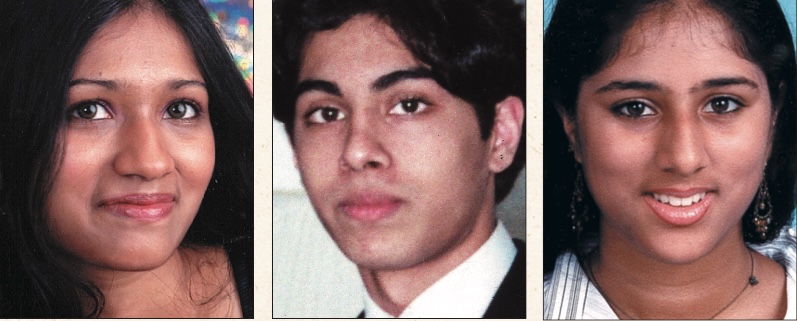In a March edition of Hindu Press International, our daily e-mail news service, we invited essays from Hindu teens and young adults of Indian origin living in the USA, ages 13 to 25, to discuss the challenges they face as they reconcile Eastern religious culture with Western daily life. The submissions that we received were heart-felt, honest and revealing. We share some excerpts below:
Shurjendu Dutt-Mazumdar, 19, New York: India and America: one is my motherland, the other, my fatherland. To deny one at the expense of the other would be foolhardy. The Gods and Goddesses of India speak in unison to the universal essence of oneness, while the starry blue of America hails the ideals of democracy and freedom. While I have personally witnessed a great deal of ambiguity, mutual exclusivity and “black and white ” understandings expressed by fellow “split nationals, ” I have had no problem being a Hindu-Indian-American. I only pray that my own weaknesses and aspirations to worldly success are tempered by the age-old Hindu edicts of love for God, reflection on the Self and firm adherence to dharma (righteous duty). The ideals of America and of India are but two manifestations of the One. I feel that both these cultures, when culled of the extraneous and embraced at the core, can work harmoniously to encourage self-growth. It is up to me to respond well to the proffered hand of opportunity.
Shivangi Gandhi, 17, Illinois: I immigrated to America with my parents when I was ten. As a young girl, I stayed as “Indian ” as possible, and my parents were proud of me. As the years passed by, however, I became misguided, thinking that in order to become a part of “American life, ” I had to let go of the culture of my birth. In the high school I attended, which was 98 percent Caucasian, I was confronted by Americans–and many Indians as well–who mocked me for my Indian behavior. At that time, I chose to conform to American culture because I was tired of being laughed at and excluded. This concerned my parents. During my first week in college, I met a young man from India. He had all those qualities that any Indian mom and dad would be proud of. Yet he had managed to conform to the American culture. As we became closer friends, I learned from him that being Indian was not something that I should be embarrassed about. Rather, it should be a source of pride. My parents were ecstatic to learn that, in college, I joined an Indian organization that stressed Indian culture, and was invited to join another group that promotes Hinduism.
Saagar Ashvin Pandit, 13, Connecticut: I was born here in America, but my parents are from India. The town I live in and the school I attend have a good sense of cultural diversity and sponsor programs that foster this awareness. Our town library recently organized two events entitled World of Words and United Nations Day, which featured Hindu books and artwork and provided information on our culture and tradition. I have not experienced any racial intolerance so far. But I do speak out, because I believe that everyone has a role to play in maintaining harmony, racial or otherwise. I try to respect the religious heritage of others and expect the same in return. First and foremost, however, I am proud of my Hinduism and my “mother country, ” India.
Swetha Rao Surapaneni, 17, California: When I started elementary school, all my friends were Indian Hindu. We got along well together because we shared the same values and beliefs. Then I got to know other “Asians, ” including kids who were Chinese, Japanese, Korean and Taiwanese. I discovered that I was similar to these people in many ways. In high school, my group of friends expanded even more to include kids who are Caucasian, Mexican and African American. I even know some Christian Indians. For me, all of these different influences have helped me a lot. Our Hindu religion tells us not to put down others, or to try and convert them, but rather to try and learn from them and embrace them.
Priya Pandit, 15, Connecticut: Some occurrences in my life have rattled me momentarily and made me speak up for my civil rights. Once, a girl noticed a small picture of Ganesha in my binder. She started asking me questions. My explanation of the Hindu elephant God surprised her. “Ooh, why would any one want to pray to an elephant!” she exclaimed. I was shocked. I politely suggested that if she was ever inquisitive about my faith, she might feel free to ask me questions but restrain from making any rude remarks. I have also experienced racial acceptance. A local YMCA chapter allowed me to host an auction to collect money for a good cause in service of our local Hindu temple. This was a refreshing incident for me!
